China Society
Unanswered Questions Linger in the Aftermath of Tangshan BBQ Restaurant Beating Incident
The deafening silence surrounding the female victims of the Tangshan incident is trending on Weibo, where people are demanding answers.
Published
4 years agoon
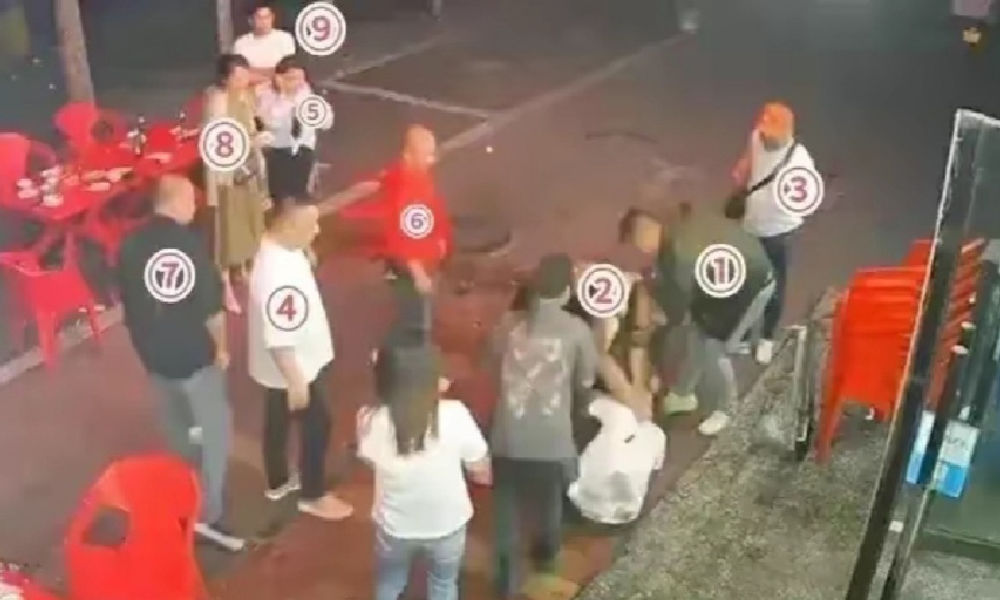
The shocking attack on female customers at a Tangshan BBQ restaurant on June 10 is still a major topic of conversation on Chinese social media, where the incident is also referred to as the “Tangshan Barbecue Restaurant Beating Incident” (唐山烧烤店打人案).
For a detailed description of the incident, which was captured by the restaurant’s security cameras (video link), see our previous article here.
In short, three women were sitting at a table together at 2:40 AM when a man came up and tried to touch one of them (a woman dressed in white). After the woman made it clear that she did not want him to touch her, the situation turned violent within seconds.
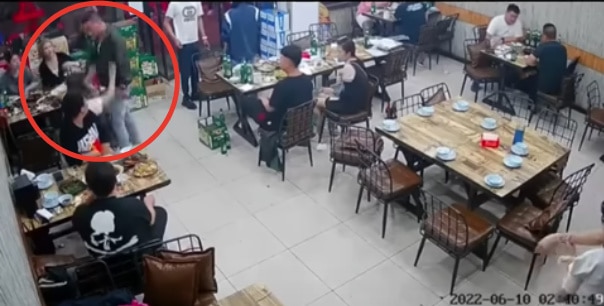
All of the women ended up getting beaten and kicked by a group of men. The woman dressed in white was dragged outside, where security cameras captured her being severely assaulted by the men. Another woman who tried to help her also ended up being beaten. After the outburst of violence, the men fled the scene, leaving the injured woman lying on the street. A day later, a total of nine men were arrested for their involvement in the attack.
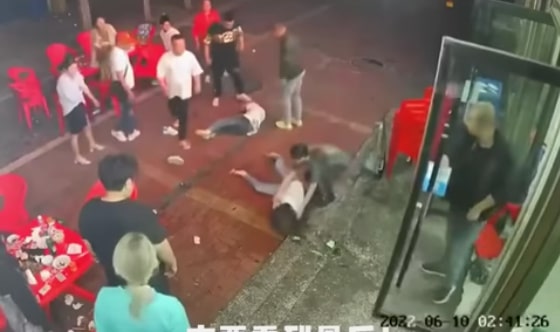
While the two women lie motionless on the pavement, the men stand around.
The ‘Tangshan Barcebecue Beating Incident’ sent shockwaves across the country and triggered discussions on gang crimes, the safety of women, and what people can do to protect themselves and others.
Many restaurants took steps to provide women reassurance that they were safe and some businesses put up warning signs that any form of violent or aggressive behavior would not be tolerated.
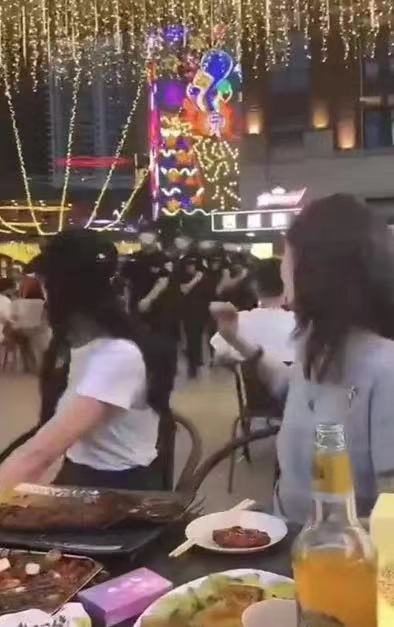
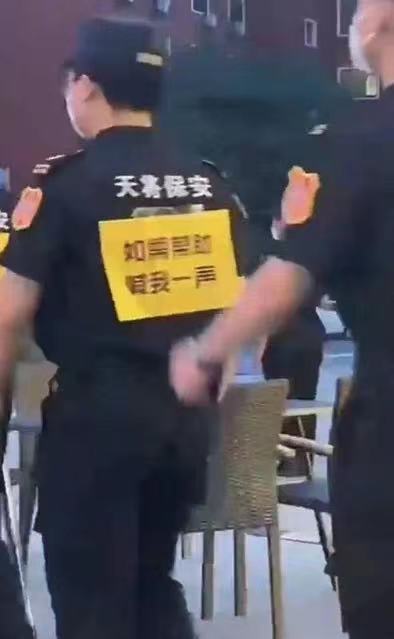
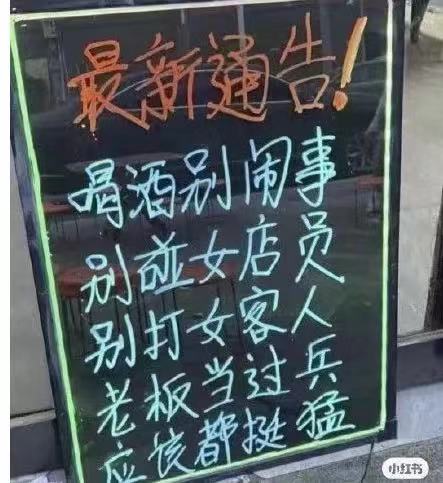
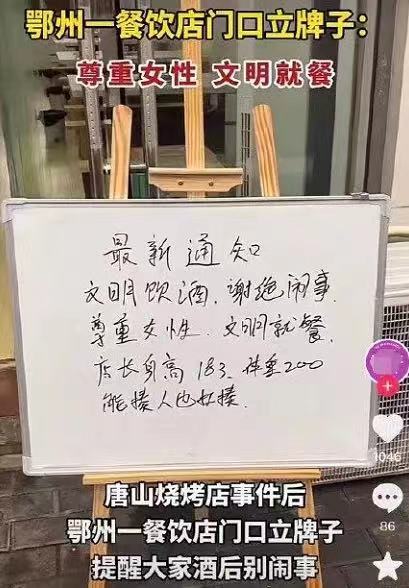

Tangshan authorities also took action against crime in the city, introducing operation ‘Thunderstorm’ (雷霆风暴) on June 12, a two-week campaign for which a team of police officers are mobilized and deployed throughout the city to ensure public safety and crackdown on gang crimes.
The Tangshan incident led to dozens of people publicly discussing and exposing gang-related crimes. The fact that at least five of the suspects had criminal records was a cause of anger among those who felt that they should not have been allowed to be out and about at all. One former victim of a man involved in the attack also spoke out. He said he recognized Chen Jizhi (陈继志) from the security footage and that he was locked inside the trunk of a car for ten hours by Chen a few years prior. A hashtag related to the story received over 300 million views on June 17th (#男子称曾被陈继志等殴打险被活埋#).
Other people exposed other gang-related crimes via social media, disclosing their real names and holding their own ID in their hand to make their statements more credible.
One of them was a woman by the name of Zhang, who claimed that she was held hostage in May of this year at the bar where she worked by a local gang and was forced to sign IOUs together with her colleagues. After escaping and reporting to the police, they allegedly did not show up until seven hours later when everyone was gone. This story heightened people’s suspicions regarding police corruption in Tangshan.
Another story that went viral this week is that of a local ‘cake shop boss,’ who also claimed to be a victim of a local gang that has been extorting him since July of 2021, going as far as violently smashing up his shop and closing his business. One news post about this matter received over 340,000 likes on Weibo.
Deafening Silence Surrounding Victims
In light of the Tangshan restaurant beating, it seems as if everyone has stepped forward to have their say over the past week. The city has come forward with its special action, local businesses have put up signs, the owner of the restaurant where the assault took place published a tearful video in which she said that she too was a victim, some suspects’ family members also spoke out and pleaded with the public not to let their children suffer cyberbullying, and then other locals have spoken out about gang-related violence in the city.
The Tangshan bbq restaurant owner speaks out: she can’t run her business nor stay sane under the stress after the outburst of violence that happened on Friday. She’s being blamed for not doing enough to prevent the men from attacking the women, but she says she is a victim, too. pic.twitter.com/X8xjQpacMK
— Manya Koetse (@manyapan) June 12, 2022
But what about the female victims of the June 10th violence themselves? No statements, no updates, no family coming forward – the silence surrounding the female victims has been attracting a lot of attention on Chinese social media these days.
Many Weibo users suggest that news about the victims is purposely withheld and that people are being silenced about how the women are actually doing.

Text image shared on Weibo. “Please provide details about the injuries of the four girls. Four, not two! Stop covering up your mouth!”
According to previous official media reports, two female victims had been sent to the hospital for treatment and were in stable condition. Two other women reportedly suffered minor injuries and were not hospitalized. No further updates have been given, although the hospital did deny recent rumors that one female victim had passed away (hashtag #医院否认唐山被打女子去世传言#, 190 million views on June 17).
Online calls are growing louder for a follow-up on the victims’ situation and a more detailed report on what actually happened at the Tangshan Barbecue Restaurant. There are many people who are wondering what happened outside the view of the security cameras.
The original footage shows that when the violence starts, a woman (dressed in black) stands up from the table to defend her friend: she hits the aggressive man at their table with a beer bottle. Once her friend (dressed in white) is dragged out of the restaurant, we do not see her come out after.
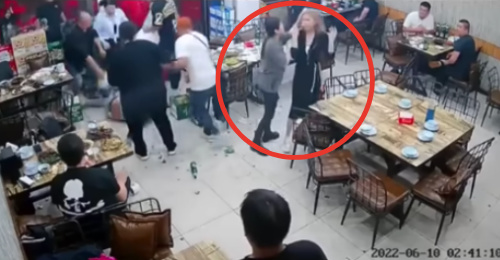
This is the moment the two women are standing up while their friend is being dragged out of the restaurant. The woman on the right (in black) does not come out later.
On social media, people are speculating about what might have happened to the girl dressed in black and about what occurred in an alley behind the restaurant.
Security footage that was recorded from another angle shows that after the moment when the original video that spread online ends (at the end the guys leave, the girl is left on the street), the incident still continues. One of the women can be seen running into an alley or street behind the restaurant, with the others following. The woman in white, who was dragged by her hair, also stands up and runs away in the same direction.
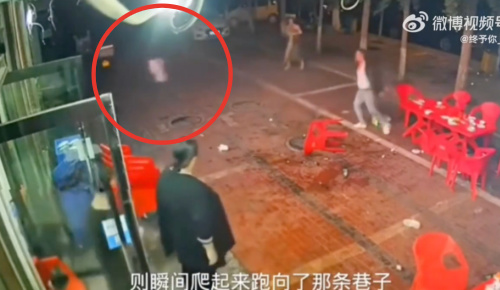
“What happened in the back alley?” is a question that lingers online, along with multiple other questions relating to what went on after the original video footage ended that night. One Weibo post asking many of these questions received over 275,000 likes within a day.
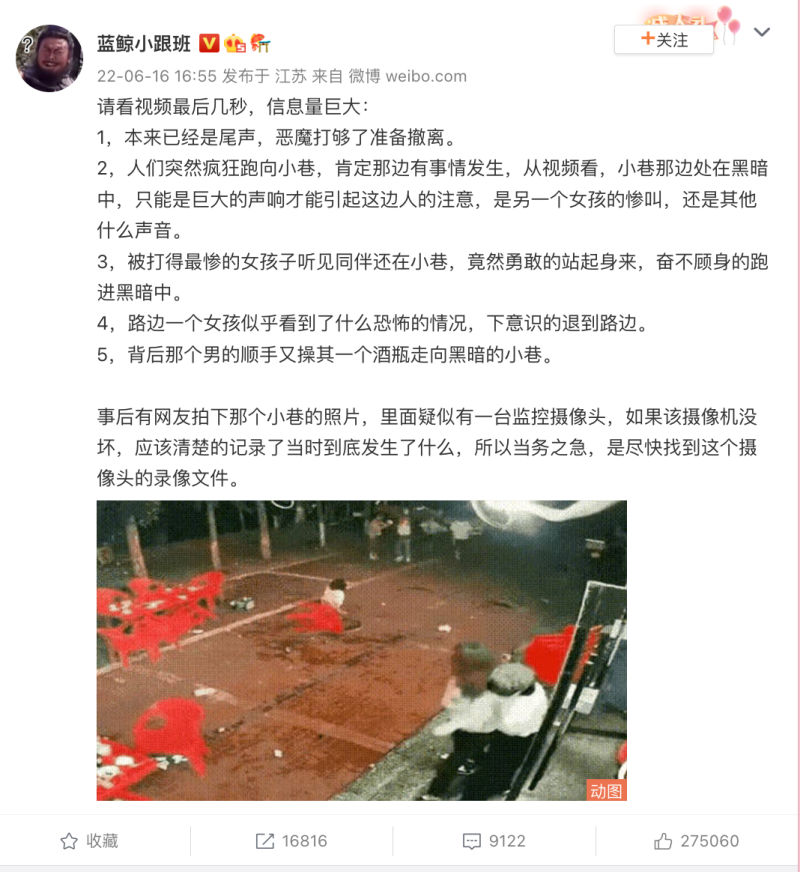
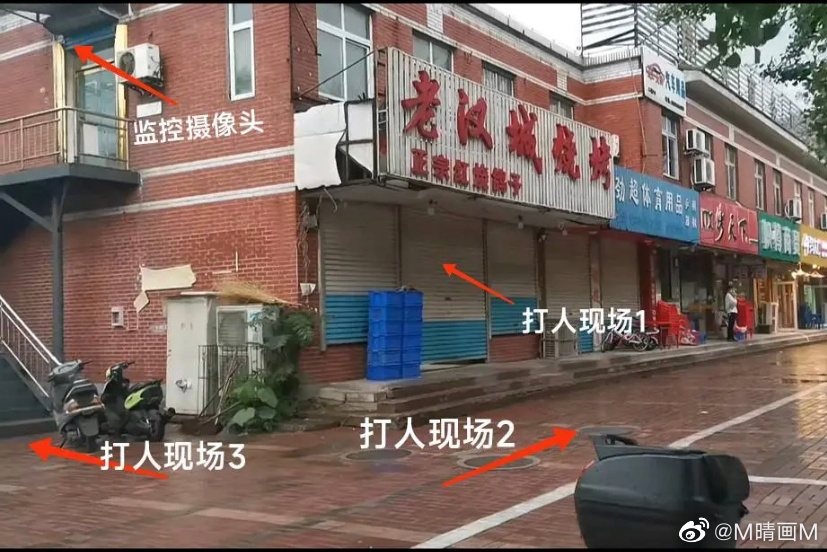
Image allegedly showing the back alley where the incident possibly continued.
The hashtag “Follow-up to the Tangshan Beating of Women” (#唐山被打女生后续#) received over 210 million views on Weibo on June 17. “The entire nation is waiting for a follow-up,” one Weibo user wrote.
Meanwhile, various videos, images, and sound recordings are flooding Weibo, but nothing has been verified at this point regarding what might have happened in the alley behind the restaurant. “I don’t want to believe it’s real. But I don’t know what to believe anymore,” one commenter said.
On Friday night, Chinese media reported that 320 Weibo accounts had been shut down for spreading rumors about the Tangshan incident and its aftermath. The hashtag related to the news received over 580 million views on Friday (#发布唐山打人事件谣言320个微博账号被关闭#).
Underneath the post, many commenters wrote: “We just want to know if the girls are okay” and “We just want to know the truth.”
By Manya Koetse
with contributions by Miranda Barnes
Get the story behind the hashtag. Subscribe to What’s on Weibo here to receive our weekly newsletter and get access to our latest articles:
Spotted a mistake or want to add something? Please let us know in comments below or email us. First-time commenters, please be patient – we will have to manually approve your comment before it appears.
©2022 Whatsonweibo. All rights reserved. Do not reproduce our content without permission – you can contact us at info@whatsonweibo.com.
Manya is the founder and editor-in-chief of What's on Weibo, offering independent analysis of social trends, online media, and digital culture in China for over a decade. Subscribe to gain access to content, including the Weibo Watch newsletter, which provides deeper insights into the China trends that matter. More about Manya at manyakoetse.com or follow on X.

Chapter Dive
Why Were 100,000 Pregnant Women’s Blood Samples Smuggled Out of China?
How and why fetal sex testing became a national security story
Published
2 weeks agoon
December 25, 2025
A noteworthy story in Chinese media recently, which also made it to the top trending lists on Kuaishou and Weibo, concerns the uncovering of a widespread criminal network that smuggled blood samples from over 100,000 pregnant women across the border, exposing a black-market chain active across all provinces of China. In this deeper dive, I look at what received far less attention: why so many pregnant women were willing to provide their blood in the first place.
The case was part of a major operation by Guangzhou’s anti-smuggling authorities following a year-long investigation and the mobilization of 265 officers. As part of the operation, two professional criminal groups specializing in the smuggling of pregnant women’s blood samples were dismantled, and a total of 26 people were arrested.
The groups earned a staggering 30 million yuan (US$4.2 million) from their blood-smuggling activities.
So far, the story reads almost like a vampire novel, especially with Chinese media detailing how the blood was smuggled: smugglers reportedly strapped tubes of blood to their bodies to cross the border. Others hid them in specially modified suitcases with concealed compartments.
Some commenters framed the story as the smuggling of “life samples carrying the genetic code of Chinese citizens,” and as the “poaching of ethnic genetic resources,” arguing that the data security implications could be serious if the blood were to be used for research by those with ulterior motives.
Other netizens suggested that “insiders within medical institutions must be involved,” possibly even through broader “cross-border project collaborations.” These suspicions were fueled by official reporting. Overall, the online media discourse surrounding the case focused on the risks these practices pose to national biosecurity, with fears that foreign entities could appropriate China’s human genetic information.
In reality, however, this story is about the widespread demand in China for prenatal blood testing for fetal sex determination.
The groups uncovered by Guangzhou authorities received blood from some 100,000 pregnant women because the women provided it themselves. The groups (illegally) advertised on social media that they offered non-invasive fetal sex identification and genetic disease screening, with clients paying fees of 2,000–3,000 yuan (US$285–US$426) for these blood tests.
According to Guancha.cn, the blood would be drawn by “acquaintances” or through online medical platforms, after which the samples would be mailed by courier to a designated address, where they were collected, concealed by smugglers, and delivered to overseas laboratories for testing.

Smuggled blood as seen in CCTV feature
Although none of the Chinese news reports on this case disclose where these “overseas labs” are actually located, the reports mention cooperation between authorities in Guangzhou, Foshan, and Shenzhen, and the details provided make it highly probable that the case concerns the mainland–Hong Kong border.
In a recent CCTV feature on the news, Zheng Zhong (郑重), Deputy Director of the Investigation Division of the Guangzhou Customs Anti-Smuggling Bureau, said:
“China has explicitly prohibited the determination of fetal sex for non-medical needs, which is a protection of the fetus’s right to life. It is also to maintain a healthy population ratio. Blood sample smuggling poses a high potential risk to public interests and national biosecurity.”
Fetal sex determination has been illegal in China since the first regulation in 1989, with later laws specifically outlawing the use of ultrasound imaging or other techniques to identify fetal sex.
Why Fetal Sex Determination Still Matters
Why did Zheng mention the prohibition of fetal sex determination tests in China to “maintain a healthy population ratio”?
Although abortion has generally been permitted in China—which has one of the most lenient abortion regimes in the world—strict controls on sex-selective abortions have been in place since the early 1990s.
One of the unintended effects of China’s one-child policy since 1979 has been the widespread occurrence of sex-selective pregnancy terminations, linked to traditional son preference. Fetal sex identification has been a precursor to these abortions, contributing to severe distortions in the country’s sex ratio. Non-medical fetal sex identification and sex-selective abortion came to be known as the “two illegitimates.”[1]
Now that China is entering its first decade since the end of the one-child policy, you might expect that these “two illegitimates” have become less pressing issues. After all, with couples now allowed to have more than one child (even three children or more), why would sex determination still be so relevant that 100,000 women would continue to submit blood samples despite the practice officially being illegal?
🔎 In reality, research suggests that the end of China’s one-child policy has not been the turning point it was perhaps expected to be. Although it has reduced pressures, its impact on son preference and sex-selective practices has been somewhat underwhelming.[2]
Since 2016, there has indeed been a rise in daughter preference and gender indifference, as well as a decline in male-to-female sex ratios at birth, but significant regional differences remain and son preference persists, alongside sex-selective abortion.[3] As a result, the sex ratio at birth remains skewed in certain provinces, especially for first births.[4]
👉 So what does this mean in practice? It means that, despite laws and regulations, expecting parents are still eager to find ways to identify fetal sex by whatever means possible (blood-based tests, ultrasound scans), and that agencies able to profit from this desire have been widespread for years.
In provinces like Jiangxi, Fujian, Guangdong, Guangxi, Hubei, and Hunan, which together with Hainan accounted for more than a third of all births in China in 2020, there is still a deeply rooted familism culture and an abnormally high number of male births.[5]
Even though Chinese authorities introduced specific measures more than a decade ago to ban the mailing of blood samples overseas for fetal sex identification, underground networks smuggling fetal blood samples to Hong Kong for gender testing have been rampant—and this goes well beyond 100,000 samples.
Framing Pregnant Women’s Blood Smuggling in Chinese State Media
It is noteworthy that Chinese coverage of this case leaves out issues related to fetal sex selection, the persistence of sex-selective practices in post–one-child China, and parents’ willingness to learn the sex of their fetus to such an extent that they are prepared to pay large sums of money for this information.
In the 8-minute CCTV feature on this case, as well as in other reports, the core narrative centers on how an organized criminal network that endangered national biological security by illegally smuggling pregnant women’s blood samples was successfully dismantled by Chinese authorities through state surveillance and coordinated law enforcement.
China has, in fact, strict laws on the protection of human genetic resources. Since 2019, regulations have specifically prohibited foreign entities from collecting genetic material within China and restricted the transfer of genetic material and related data out of China. Any research involving Chinese human genetic resources must be conducted through approved collaboration with a qualified Chinese institution (see China Law Translate).
In the CCTV report, fetal sex identification is mentioned only briefly: first, in describing how the criminal group attracted customers online, and second, by Zhong, to emphasize that the practice is illegal. This framing places the entire issue within the domains of legality, regulation, and security, while the ethical, socio-cultural, and gender dimensions that lie at the root of the practice are entirely ignored.

Word cloud generated with the assistance of AI, based on the fully transcribed and translated text of the main CCTV investigative report on the blood-smuggling case.
Instead, the case is narrated using dominant language such as “blood smuggling,” “genetic resources,” and “security.” This framing has led to some confusion online. One of the most popular search queries related to the story on Weibo was: “What is the purpose of smuggling pregnant women’s blood samples abroad?” (孕妇血液样本走私境外目的是什么).
On Xiaohongshu, some commenters similarly asked: “I just don’t understand what pregnant women’s blood is used for.” Another user replied: “They can extract genetic codes, create a virus, and kill us with it.”
There are, however, many commenters who directly connect the case to its underlying issue. One woman on Xiaohongshu asked: “Isn’t it possible to tell [the fetus’s sex] just by doing a B-ultrasound? Why would they spend so much money to draw blood?” Another commenter replied: “It takes several months before you can do an ultrasound. A blood test is faster, and you can know the result before the abortion deadline.” (In some regions of China, non-medical abortions are not permitted after 14 weeks of pregnancy.)
Demographic Anxiety and Shifts in Narratives
Chinese headlines about the uncovering of the blood-smuggling operations appeared in the same week when netizens discussed unofficial reports about China’s 2025 estimated birth rates, suggesting that the country’s fertility rate will hit another historic low and fall to second-lowest in the world (higher only than South Korea), with a total fertility rate of about 1.09.
“Let people with money have kids,” some commenters suggested. “Right now, it’s hard for young people to get a job. When you can’t even find a job, who would think of having kids?”
Another person on Weibo wrote: “I’m part of the elite social class with a PhD degree, and yet I’m miserable. I’m pessimistic and disappointed about the future. I won’t have kids, won’t buy [a house], and won’t get married.”
Over the past years, and especially recently, Chinese authorities have introduced numerous measures in attempts to boost the country’s birth rates, from child-rearing subsidies to taxes on contraceptives.
In this light, tackling illegal practices involving fetal sex identification is more relevant than ever—and pushing such news to the top of China’s trending lists, together with frightening narratives about blood thieves and biosecurity risks, serves as a warning as much to smugglers as to expecting mothers not to engage in such practices. In this context, expecting parents would not only be crossing legal red lines by testing the sex of their unborn child, but would also be framed as handing over China’s national DNA to potential foreign enemies.
🔴 In doing so, Chinese official narratives shift, yet also fall back into old habits: at a time when fertility is dramatically dropping and confidence among young people in love & marriage is eroding, the state does more than regulate or guide ideas about family planning and fetal sex determination; it changes the meanings attached to it.
But there’s also a side effect to these stories. Because official news coverage presents the case as one of potential risks of Chinese genetic data being stolen, while largely leaving out the relevant social context, some ordinary Chinese netizens have begun to worry about what happens to their blood samples at hospitals once they leave their check-up appointments.
“Can they profit from it?” some wonder, while others worry about unintentionally contributing to future biological warfare.
Ultimately, the story of “blood smuggling” is not just about smugglers or overseas laboratories. It is about how, in an era of increasing demographic anxiety, reproductive behavior is increasingly reframed through the language of security.
Luckily, many genuinely don’t see what all the fuss is about: “People would really smuggle pregnant women’s blood abroad for what? Is it really so important to know whether you’re having a boy or a girl?”🔚
📌🎬 Although I also published last week, I didn’t send that article as a newsletter. So, in case you missed it, here’s a short recap: the past year has been a tumultuous one for China’s entertainment industry, and especially for renowned director Wong Kar-wai. After the success of the TV drama Shanghai Blossoms, a former screenwriter accused Wong and his team of discrediting, exploiting, and abusing him.
The case was already explosive, but it became even more sensitive when audio recordings were leaked in which Wong criticised the Party. Almost any other celebrity would likely have been blacklisted for such remarks, yet Wong seems to have escaped that fate. Why? You can explore the case in this in-depth article by Ruixin Zhang. It’s worth the read.
👉 This piece is part of Chapters, the format I use for deeper, more analytical pieces. Alongside Chapters, I also publish Signals, which tracks slower-moving shifts in Chinese online culture and digital life, and China Trend Watch, which offers a regular overview of what has been trending across China’s digital platforms. Keep an eye on the upcoming editions to follow the thread.
By Manya Koetse
(follow on X, LinkedIn, or Instagram)
[1] Ruby Lai Yuen Shan, “The Transformation of Abortion Law in China,” in Research Handbook on International Abortion Law, edited by Mary Ziegler (Cheltenham, UK: Edward Elgar Publishing, 2023), 172–73.
[2] Xinyi Zhang, “Estimating the Effect on the Sex Ratio of the Two-Child Policy: Evidence from China,” Proceedings of the International Conference on Social Psychology and Humanity Studies 9 (2023): 1–8.
[3] Li Mei and Quanbao Jiang, “Sex-Selective Abortions over the Past Four Decades in China,” Population Health Metrics 23, no. 6 (2025): 1–16.
[4] Mengjun Tang and Jiawei Hou, “Changes of Sex Ratio at Birth and Son Preferences in China: A Mixed Method Study,” China Population and Development Studies 8 (2024): 1–27.
[5] Tang and Hou, “Changes of Sex Ratio at Birth,” 4–5.
Spotted a mistake or want to add something? Please let us know in comments below or email us. First-time commenters, please be patient – we will have to manually approve your comment before it appears.
©2025 Whatsonweibo. All rights reserved. Do not reproduce our content without permission – you can contact us at info@whatsonweibo.com.
China Celebs
China Trend Watch: Quiet Nationalism, Loud Statements, and Nanjing Memorial Day
From war memory to viral eggs, salty cakes, an unfortunate dinner party and farewell to an iconic actress.
Published
4 weeks agoon
December 14, 2025
🔥 China Trend Watch — Week 50 (2025)
Part of Eye on Digital China. This edition was sent to paid subscribers — subscribe to receive the next issue in your inbox.
Welcome to the Eye on Digital China newsletter. This is the China Trend Watch edition — a quick catch-up on real-time conversations.
I’ve rounded up my latest China trip that brought me from Chongqing to Nanjing, Wuhan, Zaozhuang and Beijing, for some of my research on Chinese remembrances of war. Along the way, I have met many friendly people and had interesting converations, from hanging out with a group of Wuhan teenagers to lively conversations with retired seniors in Shandong.
A small and short personal observation, if I may, regarding the current tensions between China and Japan.
I vividly remember the atmosphere on the streets during earlier moments when tensions ran sky-high—most notably in 2012, after a major diplomatic crisis erupted over Japan’s nationalization of several disputed Senkaku/Diaoyu Islands. That episode triggered large-scale anti-Japanese protests across China and spilled unmistakably into everyday life. In Beijing’s Sanlitun area, for instance, there was a street food vendor who put up a large sign proclaiming, “The Diaoyu Islands belong to China.” In the hutong neighborhoods, it seemed as though virtually every household had hung a Chinese flag by its door. Books about Japan that I purchased locally later turned out to have entire pages ripped out. My favorite sushi restaurant suddenly displayed a sign explaining that its brand was, in fact, very Chinese and had nothing to do with Japan. Nearby, in the clothing markets around the Beijing Zoo, T-shirts bearing nationalistic slogans related to the islands dispute were on sale at multiple stalls.
By contrast, during my most recent stay in Nanjing and beyond—despite the increasingly militant tone of state media and social media campaigns surrounding Japan, and despite the undeniable persistence of anti-Japanese sentiment—I noticed far fewer visible expressions of it in daily life. There were no slogan T-shirts, no banners, no overt street-level signaling. While news came out that a string of Japanese performances in China were canceled, I noticed hotel waitress fully dressed in a Japanese kimono at an in-house Japanese restaurant. Local bookstores are filled with works by Japanese authors, and Japanese popular culture appear to be thriving and coexisting comfortably with China’s own flourishing ACG (anime, comics, and games) industry.
Is there simply less anti-Japanese sentiment than over a decade ago? Or is it, perhaps, that in today’s highly digitalized Xi Jinping era, nationalist narratives are more tightly managed and increasingly channeled online—making people more cautious, more restrained, or simply less inclined to express political sentiments openly in public space?
A cab driver in Chongqing told me he believed there was “something wrong” with Japanese Prime Minister Sanae Takaichi and the influence she has had on bilateral relations since her rise to power. While supporting his government’s tough stance and expressing sadness over the scars left by war, he also mentioned that he had enjoyed a pleasant conversation earlier that same morning with a young Japanese man he had driven to the train station.
“We didn’t talk about the latest clash,” he said. “If find that too sensitive to mention. He spoke Chinese, he studied Chinese, like you. I don’t hate today’s Japanese people at all. In the end, we’re all just people. What’s happening now is something between the leadership.”
He spoke at length while driving me to the station, signaling that the topic clearly weighed on him. It left me with the sense that the absence of banners or T-shirts does not mean the issue has faded from everyday life, only that it is not expressed as a mass spectacle like it was in earlier years. It has become quieter, more online, and more filtered through official narratives, but it is still very much alive.
There is a lot more to say, but it is Sunday after all, and there is plenty more to read here, so let’s dive in.
- 🍓 Chinese consumers were pretty salty this week when discovering their pricey strawberry cake from Alibaba supermarket chain Hema (盒马) tasted all wrong. Hema acknowledged a production issue (they didn’t say it outright, but salt was allegedly used instead of sugar) and the incident triggered discussions about food safety & quality control in automated food production, especially when such a major mistake happens at high-profile companies.
- 🌡️ China’s announced ban on mercury thermometers (as of Jan 1st 2026) has sparked a buying frenzy, as many consumers, reluctant to switch to electronic alternatives, still prefer mercury models for their perceived accuracy and convenience. Despite nearly half of annual mercury poisoning cases being linked to broken thermometers, prices have now surged from around 4 yuan ($0.6) to over 30 yuan ($4.25), and stores have reported complete sellouts.
- ❄️ Beijing welcomed its first snowfall of winter 2025 this week, leading to lovely social media pics and the Beijing Palace Museum tickets selling out instantly. Experiencing and capturing that first snowfall at the Forbidden City has become somewhat of a holy grail on social media.
- 🕵️♂️ A local construction site in Shanghai unexpectedly became the scene of a modern-day treasure hunt after dozens of residents armed with shovels and metal detectors rushed to the area following online rumors that silver coins (including valuable older ones) had been found. Authorities had to intervene and, while not confirming the rumors, emphasized that any buried cultural relics belong to the state.
- 🇷🇺 Since this month, Chinese citizens can enter Russia visa-free for up to 30 days, a policy that led Chinese state media to claim that “Russia is replacing Japan as a new favorite among Chinese tourists.” On social media, however, the vibe is different, with travelers complaining about high prices, poor internet, lack of online payments, unreliable ATMs, and the need for thorough trip preparation — all reasons why Russia is unlikely to become the go-to destination for the Chinese New Year.
- 🫏 An investigation by Beijing Evening News revealed that many of the capital’s popular donkey meat sandwich shops are actually serving horse meat without informing customers. China’s donkey shortage — driven by declining domestic supply, rising demand for the traditional Chinese medicine Ejiao (which uses donkey hides), and an African export ban — has been a hot topic this year. Now that it’s directly affecting a beloved delicacy, the issue is drawing even more public attention.
1. Why This Year’s Nanjing Memorial Day Felt Different

Posters published by various Chinese state media outlets to commemorate the Nanjing Massacre.
December 13 marked the 88th anniversary of the fall of Nanjing, and this year’s Nanjing Memorial Day (南京大屠杀难者国家公祭日), although described as a low-key commemoration by foreign media, was trending all over Chinese social media.
During the Second Sino-Japanese War, on December 12, 1937, the Japanese army attacked Nanjing from various directions, and defending Chinese forces suffered heavy casualties. A day later, the city was captured. It marked the beginning of a six-week-long massacre filled with looting, arson, and rape, during which, according to China’s official data, at least 300,000 residents, including children, elderly, and women, were brutally murdered.
This year, the Nanjing Massacre Memorial Day, which was first officially held as a state-level event in 2014, carried extra weight. This dark chapter of history has continuously been a sensitive topic in Sino-Japanese relations, but with recent diplomatic tensions between the two countries reaching new heights, the Memorial Day was especially tied to current-day relations between China and Japan and to Prime Minister Sanae Takaichi, who has been described by Chinese media as an “ultranationalist” with tendencies to downplay Japan’s wartime aggression. Takaichi’s November 2025 parliamentary statement that a Chinese military action against Taiwan could be considered a “survival-threatening situation” for Japan, allowing for the deployment of its Self-Defense Forces, continues to fuel Chinese anger.
The link between history and current-day bilateral relations was visible not only on social media, but also during the commemoration itself, where Shi Taifeng (石泰峰), head of the ruling Communist Party’s Organization Department, said that any attempt to revive militarism and challenge the postwar international order is “doomed to fail.”
Besides the many online posters disseminated by Chinese official accounts on social media focusing on mourning, quiet commemoration, and honoring the lives of the 300,000 Chinese compatriots killed in Nanjing, one official online visual stood out for displaying a louder and more aggressive message—namely that posted by the official Weibo account of the Eastern Theater Command of the Chinese People’s Liberation Army (@东部战区).

The visual posted by the PLA Eastern Theater Command, titled: Rite of the Great Saber (大刀祭).
The visual showed a strong hand holding a giant blood-stained blade that is beheading a skeleton wearing a helmet marked “militarism,” with images related to the Nanjing Massacre visible on the blade and, behind it, a map of East Asia. The number “300000” appears in red, dripping like blood. At the top, the characters read “Rite of the Great Saber” or “The Great Saber Sacrifice” (大刀祭).
The official account explained the visual, writing: “(…) 88 years have passed and the blood of the heroic dead has not yet dried, [yet] the ghost of militarism is making a comeback. Each year, on National Memorial Day, a deafening alarm is sounded, reminding us that we must—at all times hold high the great saber offered in blood sacrifice, resolutely cut off filthy heads, never allow militarism to return, and never allow historical tragedy to be repeated.”
The text’s “cut off filthy heads” phrasing is similar to part of a now-deleted tweet sent out last month by the Chinese Consul General in Osaka, Xue Jian (薛剑), who responded to Takaichi’s controversial Taiwan remarks by writing (in Japanese): “If you come charging in on your own like that, there’s nothing to do but cut that filthy neck down without a moment’s hesitation. Are you prepared?” (“勝手に突っ込んできたその汚い首は一瞬の躊躇もなく斬ってやるしかない。覚悟が出来ているのか。”)
The recent visuals, social media approach, and shifts in texts reflect a clear change in tone in Chinese official discourse regarding Japan and the memory of war, moving the narrative from victimhood toward a more confrontational and militant tone.
2. He Qing, China’s “No. 1 Classical Beauty”, Passes Away at 61

He Qing. Images on the sides: the four famous roles in China’s most iconic tv dramas.
China’s “No. 1 Classical Beauty” (古典第一美女), He Qing (何晴), who starred in all four of China’s most beloved and canonical television dramas, passed away on Saturday at the age of 61. On December 14, news of the famous actress’s passing was trending across virtually all Chinese social media apps.
Born in 1964 into an artistic family in Jiangshan, Zhejiang Province, He Qing received traditional Chinese opera (Kunqu) training at the Zhejiang Kunqu Opera Troupe. Her debut in the entertainment industry may have come by chance, as she reportedly once met Chinese director Yang Jie (杨洁) on a train, which led to her joining the production of Journey to the West (西游记), where she played Lingji Bodhisattva (灵吉菩萨).
In China, He Qing is remembered as a veteran actress in much the same way that some famous Hong Kong actresses became renowned for their beauty, iconic roles, and for essentially becoming household names. More than just glitter and glamour, He Qing was especially a symbol of classical Chinese beauty and literary culture. She was the only actress to star in screen adaptations of all four of China’s “Four Great Classical Novels” (演遍四大名著): besides Journey to the West (西游记, 1986), she also appeared in Dream of the Red Chamber (红楼梦, 1987), Romance of the Three Kingdoms (三国演义, 1994), and Water Margin (水浒传, 1998).
She was married to fellow actor Xu Yajun (许亚军), with whom she had a son, Xu He (许何). Although the two later divorced, she remained close to her ex-husband and even befriended his new (and fourth) wife, Zhang Shu (张澍).
In 2015, He Qing was diagnosed with a brain tumor. After her diagnosis, she withdrew from the entertainment industry to focus on her recovery and lived a low-key life in her later years.
Her passing has prompted an outpouring of tributes from Chinese netizens and colleagues in the entertainment industry. Mourning her loss comes with a sense of nostalgia for the past, and many have praised He Qing for her timeless beauty and authenticity, which will be remembered long after her passing.
3. And Then There Were None: Dinner Party of Ten Leaves One Man with the Bill

Ten dine together, nine slip away..one left for the bill, who he refused to pay…
Do you know that nursery rhyme where ten little soldiers disappear one by one until none remain at the end? That is more or less what happened earlier this month in Chongqing, when ten people dined together at a restaurant, but—once it came time to pay—nine people left one by one.
One had to answer a phone call, another had to use the restroom, and in the end, just before midnight, only Mr. Zhang was left, facing a bill of 1,262 yuan ($180), which he refused to pay. He argued that he could not afford it and that the dinner party hadn’t been initiated by him at all; as merely a participant, the bill shouldn’t have been his responsibility.
After the restaurant called the police, the organizer of the dinner was contacted. But he, too, said he couldn’t pay. Through police mediation, Mr. Zhang then wrote a written commitment promising to pay the bill the following day and left his ID as collateral, but he still failed to make the payment.
By now, the restaurant is planning to sue and has also contacted the Chinese media. According to Zhang, who apparently has been unable to contact his “friends” to collect the money: “I did make the promise, but if I pay the money, wouldn’t that make me a sucker?” (“我的确承诺了,但你说我把钱付了,我是不是冤大头啊”)
As the story went completely viral (by now, even Hu Xijin has weighed in) comment sections filled with broader social reflections on alcohol-fueled group gatherings and unclear payment rules, where one person sometimes ends up paying for everything despite feeling it wasn’t their role to do so. In this era of digital payments, many argue it should be easy enough to go Dutch and settle the bill immediately via a group payment app.
Although Zhang is seen by some as a victim, others argue that he is still a “sucker” for not paying after having promised to do so. As one commenter put it: “Out of the ten of them, not a single one is a good person.”
Real Person Vibes [活人感 (huóréngǎn)

Every December, the ten most popular buzzwords, key terms, or expressions of the year are listed by the Chinese linguistics magazine Yǎowén Jiáozì (咬文嚼字), selecting words that reflect present-day society and changing times. Each year, the list goes trending and is widely disseminated by Chinese media.
This week, the 2025 list was released, including terms such as Digital Nomads 数字游民 (shù zì yóu mín), Sū Chāo (苏超), referring to the hugely popular amateur Jiangsu Super League football competition, and “Pre-made ××” (预制, yù zhì), following a year filled with discussions about pre-fab and pre-made food (see article).
My favorite word on the list is “Real-Person Vibes” (活人感 huó rén gǎn). The term literally consists of three characters meaning “living – human – feeling,” and it describes people, stories, or things that feel unpolished, spontaneous, and unfiltered—something that has become increasingly relevant in a year dominated by AI-generated content and visuals.
Amid over-curated feeds and AI-produced text, we crave huóréngǎn: authenticity, small imperfections, and liveliness as an antidote to a digital, artificial world.
The 9:12 Boiled Egg That Took Over Douyin

How do you get a perfect boiled egg? A Douyin user known as “Loves Eating Eggs” (爱吃蛋) has become all the rage after leaving a precise comment on how to boil eggs. His advice: First boil the water, then add the eggs, boil for exactly 9 minutes and 12 seconds, remove, and immediately run under cold water.
That simple tip catapulted his follower count from around 200 to over 3.5 million in a single week (I just checked—he’s up to 4.2 million now).
The new viral hit is a 24-year-old self-proclaimed egg expert (of course, his English nickname should be the Eggxpert). He claims to have eaten 40 eggs a day for the past five years and knows exactly how every second of boiling, frying, or stirring affects an egg. He regularly posts videos showing eggs cooked for different lengths of time.
It has earned him the nicknames “Egg God” (蛋神) and “Boiled Egg Immortal” (煮蛋仙人), and has sent boiled eggs (9 minutes and 12 seconds exactly) all over social media feeds.
Thanks for reading this Eye on Digital China China Trend Watch. For slower-moving trends and deeper structural analysis, keep an eye on the upcoming newsletters.
And if you happen to be reading this without a subscription and appreciate my work, consider joining to receive future issues straight in your inbox.
Housekeeping reminder: if you’re receiving duplicate newsletters, it’s likely because you signed up on both the main What’s on Weibo website and the Eye on Digital China Substack. If you’re a paying member on one of the two, you may receive the premium newsletter twice. Please keep the one you’re paying for, and feel free to unsubscribe from the other.
Many thanks to Miranda Barnes for helping curate some of the topics in this edition.
— Manya
Spotted an error or want to add something? Comment below or
email me. First-time commenters require manual approval.
©2025 Eye on Digital China / What’s on Weibo. Do not reproduce without permission —
contact info@whatsonweibo.com.
Subscribe
Eye on Digital China is a reader-supported publication by
Manya Koetse (@manyapan) and powered by What’s on Weibo.
It offers independent analysis of China’s online culture, media, and social trends.
To receive the newsletter and support this work, consider
becoming a paid subscriber.

Get in touch
Have a tip, story lead, or book recommendation? Interested in contributing? For ideas, suggestions, or just a quick hello, reach out here.

Trump, Taiwan & The Three-Body Problem: How Chinese Social Media Frames the US Strike on Venezuela

China’s 2025 Year in Review in 12 Phrases

China’s 10 Biggest Social Media Stories of 2025

Why Were 100,000 Pregnant Women’s Blood Samples Smuggled Out of China?

When an Entertainment Scandal Gets Political: How Wong Kar-wai Survived a Nationalist Storm

From Nobel Farewell to ‘VIP Toilets’: What’s Trending in China

China Trend Watch: Japan Tensions, Nexperia Fallout, Yunnan’s ‘Wild Child,’ & “Modern Opium”

Eye on Digital China: How Chinese Social Media Evolved from the Blog Era to the AI-driven Age

From Tents to ‘Tangping Travel”: New Travel Trends among Young Chinese

Signals: Hasan Piker’s China Trip & the Unexpected Journey of a Chinese School Uniform to Angola
Popular Reads
-

 China Arts & Entertainment6 months ago
China Arts & Entertainment6 months agoHidden Cameras and Taboo Topics: The Many Layers of the “Nanjing Sister Hong” Scandal
-

 China Insight8 months ago
China Insight8 months agoUnderstanding the Dr. Xiao Medical Scandal
-

 China Digital12 months ago
China Digital12 months ago“Dear Li Hua”: The TikTok/Xiaohongshu Honeymoon Explained
-

 China Insight5 months ago
China Insight5 months ago“Jiangyou Bullying Incident”: From Online Outrage to Offline Protest



